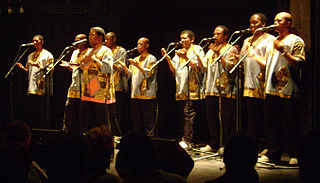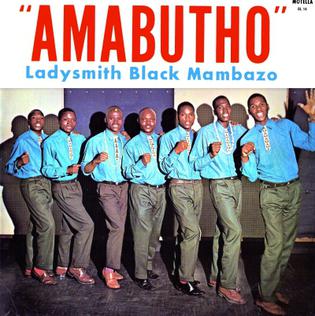Shabalala may refer to:

Ladysmith Black Mambazo is a South African male choral group singing in the local vocal styles of isicathamiya and mbube. They became known internationally after singing with American Paul Simon on his 1986 album Graceland. They have since won multiple awards, including five Grammy Awards the fifth of which they dedicated to the late former South African President Nelson Mandela.

Isicathamiya is a singing style that originated from the Zulu people, a South African ethnic group. In European understanding, a cappella is also used to describe this form of singing.
Bhekizizwe Joseph Shabalala was a South African singer and musician who was the founder and musical director of the choral group Ladysmith Black Mambazo.
Sibongiseni Lucas Shabalala, is a member of Ladysmith Black Mambazo, a South African choral group founded in 1960 by his father Joseph.
Thamsanqa Shabalala is a member of Ladysmith Black Mambazo, a South African choral group founded in 1960 by his father Joseph. He replaced Joseph as the group's lead singer after his father's retirement in 2015.
Thulani Shabalala is a member of Ladysmith Black Mambazo, a South African choral group founded in 1960 by his father Joseph.
Msizi Innocent Shabalala is a member of Ladysmith Black Mambazo, a South African choral group founded in 1960 by his father Joseph Shabalala.
Mdletshe Albert Mazibuko is a member of Ladysmith Black Mambazo, a South African choral group founded in 1960 by his cousin Joseph.
Mpindela Abednego Mazibuko is a member of Ladysmith Black Mambazo, a South African choral group founded in 1960 - and still led - by his cousin Joseph.
Ndoda Russel Mthembu is a member of Ladysmith Black Mambazo, a South African choral group founded in 1960 by close friend Joseph Shabalala.
Jabulani Frederick Mwelase Dubazana was a member of Ladysmith Black Mambazo, a South African choral group founded in 1960 by close friend Joseph Shabalala.
The Ladysmith Black Mambazo Foundation was set up in January 1999 by Ladysmith Black Mambazo lead singer and founder Joseph Shabalala. The foundation teaches the history of South African music styles isicathamiya and, to a lesser extent, mbube.
Headman Msongelwa Shabalala was a member of Ladysmith Black Mambazo, a South African choral group founded by his brother Joseph.

Amabutho is the first album by the South African isicathamiya group Ladysmith Black Mambazo. It was released in 1973 by Gallo Record Company. Amabutho was the first record by black musicians in the country to receive gold disc certification. It contains the hit single "Nomathemba". The LP was reissued on Gallo along with most of the group's early output, in February 2007. The members who sang on the Amabutho album were Milton Mazibuko, Ngali Mazibuko, Joseph Shabalala, Headman Shabalala, Enoch Shabalala, Albert Mazibuko and Walter Malinga
Mshengu may refer to:

Umthombo Wamanzi is an album by the South African isicathamiya group Ladysmith Black Mambazo. The album was recorded in May 1982, and released the next month. Whilst the group's previous output had been, for the most part, entirely composed by lead singer and founder Joseph Shabalala, Umthombo Wamanzi contained primarily traditional Zulu hymns re-arranged by Shabalala, such as "Uzube Nami Baba" and "Ungikhumbule". The members who sang in the Umthombo Wamanzi album were Abednego Mazibuko Jockey Shabalala Albert Mazibuko Jabulani Dubazana Headman Shabalala Fikile Groonwell Khumalo Russell Mthembu Joseph Shabalala.

My Dream – African Sounds is a 2008 release by the South African groups Ladysmith Black Mambazo and the SABC Choir. It was released on 30 September 2008. The album is a collaboration of both isicathamiya and choral music.
"Homeless" is a 1986 song by Paul Simon and Ladysmith Black Mambazo lead singer Joseph Shabalala.

Always With Us is a 2014 album by the South African isicathamiya group Ladysmith Black Mambazo. The album, released on 15 January 2014, is a tribute to the life of the group's matriarch Nellie Shabalala (1953-2002), the late wife of Mambazo leader Joseph Shabalala. It is also only the second album in the group's 50-year career to feature female Zulu vocalists singing alongside the male members.

Two Worlds One Heart is an album by the South African choral group Ladysmith Black Mambazo, released in 1990. The first single was "Township Jive", which the group had performed on the Graceland tour.